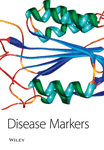Prevalence of MDR1 C3435T and CYP2B6 G516T Polymorphisms among HIV-1 Infected South African Patients
Abstract
Data on genetic polymorphisms associated with response to anti-HIV drugs has accumulated over the years. Information on how polymorphisms influence drug metabolism and transport to target sites is important in guiding dosage or selection of appropriate alternative therapies. This study determined the frequency of MDR1 C3435T and CYP2B6 G516T polymorphisms associated with the transport and metabolism of efavirenz and nevirapine, in a population of South African HIV infected patients. In addition, association of polymorphisms with immunologic and virologic factors was investigated. A 207bp of MDR1 exon 26 and a 161bp of CYP2B6 exon 4 were obtained from patients by polymerase chain reaction. Analysis of population-based sequences of MDR1 revealed a frequency of 89% and 11% of C and T alleles respectively (n=197; X2 = 0.974; p=0.324). Restriction fragment length polymorphism (RFLP) analysis of the CYP2B6 gene revealed a prevalence of 9.5% of GG, 78.4% of GT and 12.1% of TT genotype (n= 199; X2 = 65.204; p=0.00). There was no significant difference between immune recovery and decline in viral load (n=53), with genotype after repeated calculations of analysis of variance (ANOVA).




